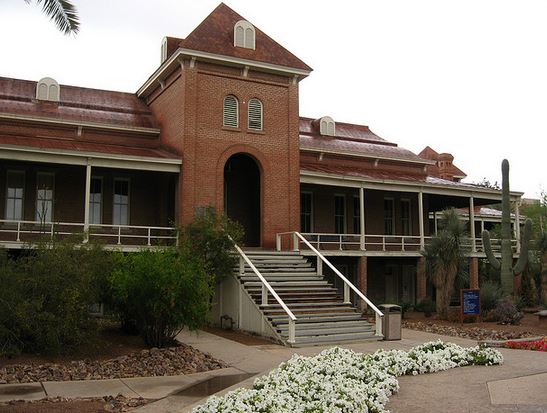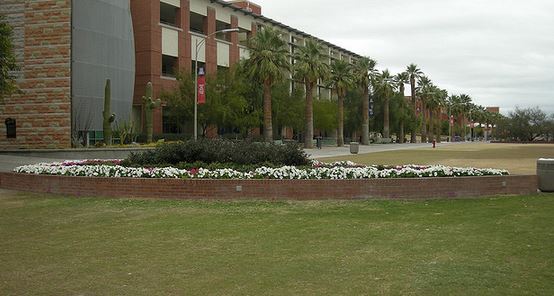How Cults Prey on Vulnerable College Students

By:
Growing up, I constantly dreamed about going to college, but when I actually arrived at the University of Arizona in Fall 2006, something wasn't right. Higher education had been idealistically presented to me as this magical land of unbreakable bonds, educational growth, and personal fulfillment, and so far, it didn't live up to the hype. I'd been wrongly placed in the UA's biggest party dorm, where hundreds of new fraternity and sorority members dominated the hallways with their social success and fast friendships, both of which I lacked. Still grieving the recent death of my father, I felt disconnected from other freshmen. It was the most vulnerable time of my young life, so when a friendly campus minister approached me one afternoon, I welcomed the positive attention.
It was refreshing to meet an educated Millennial who could talk about more than just hangovers, drinking, and nights on the town. She'd lost her dad early in life as well, and while I liked being able to relate to someone on that level, I couldn't get behind her chilling opinion on this parallel: "Our shared tragedy is why God brought us together." Looking back, I know now that what I really needed was a therapist, not a religious person with an ulterior motive. Because I grew up in a mixed Catholic and Jewish family, I decided to shrug off the remark and be open-minded about the church she represented, but as she continuously pestered me about going to services, events, and Bible study sessions, I cut off contact. I even considered changing my number as the volume of calls got out of hand. It seemed like her entire existence revolved around the ministry and that she desperately wanted others, me, to do the same.
That was more than eight and half years ago, and since my connection to that organization was fleeting, I can't recall its name. But when the Arizona Daily Star reported earlier this month that dozens of former members of Faith Christian Church, which has operated at the UA for more than decades, consider it a cult, I couldn't help remembering my own experience and wondering if the woman who tried to recruit me freshman year had been part of FCC. Whether she served FCC or another ministry, I believe her aggressive tactics were inappropriate and exploitative, and I wish the older, more confident version of me could return to freshman year and tell her to back off before she ever got a chance to start blowing up my phone. Unfortunately, she's far from the only campus evangelist to take advantage of student vulnerability. Certain religious groups capitalize on the uncertainties of college life by preying upon students who have yet to form strong relationships, ties to the campus, or identities.
Old Main at UA: Ken Lund/Flickr
UA Mall, where campus evangelists hang out: Matsubatsu/Flickr
Following the Arizona Daily Star's massive investigation on FCC, the UA said it would meet with the church's recruiting arm to address the accusations of abuse. The Arizona Daily Star exposé was published after reporters interviewed more than 20 former workers and members of FCC, which parents believe deliberately seeks vulnerable young students and sometimes urges them to drop their professional aspirations to do work for the church. The church is also being accused of encouraging moms and dads to hit their children, gradually taking control over all aspects of members' lives, draining members' bank accounts by pressuring them into donating piles of money, and telling students to distance themselves from their families, among other grievances.
“You don’t know yourself at the end,” Lawrence Alfred, who spent nearly a decade in the church and was punished for things like spending too much time alone, said to the Arizona Daily Star. “You don’t know you’re in a cult until you leave. Pretty soon, you’re at the point where you can’t make any decisions.”
Hillary Hirsch, a former member and UA alum, told the Arizona Daily Wildcat, an independent student publication, that Executive Pastor Steve Hall's daughters tried to cast out demons inside her when she dated boys. "I went over to their house and I was over there for six hours," Hirsch divulged to the Arizona Daily Wildcat. "Every hour, they’d ask me if I was ready to repent, which basically meant that you tell what you were doing and ask God’s forgiveness."
Hall insulted Hirsch's family and said it was more important for her to serve God over the military, ultimately leading her to release her full ROTC scholarship.
Religious groups that behave like cults and hone in on the college crowd are all over the country. Almost three years ago, former freelance writer Pam M. detailed her shocking experiences with a Christian cult at Old Dominion University in Virginia, explaining she got into it to figure out what she truly believed.
"[W]ay before I'd even enrolled in college, I was on a quest to figure out spiritual truth, confused, and in a sense, lost," Pam wrote in XO Jane. "I don't mean in the haven't-found-Jesus-way lost (although fundamental Christians might disagree). No, I mean I wanted to be certain about my religious beliefs...I really wanted to get the significance of it!"
This curiosity and hunger attracted a popular classmate named "Hilary," who slowly but steadily lured her into a Christian group. Overtime, Pam found herself trapped in Hilary's world. Pam had always been a top student, but her evening schedule started "filling up with more meetings, Bible discussions, dinners, and even worship dance team practices," leaving Pam little time to study. Hilary responded to Pam's academic concerns by insinuating worship was more important than scholarly pursuits, which, of course, drew Pam to higher education in the first place.
Pam broke away from the group when Hilary invited her to join her "cell group," which entailed a "spiritually mature" individual coaching twelve others on accountability. As the leader, Hilary would be Jesus and the others disciples. Pam had reservations about viewing Hilary as "Jesus," but the final wakeup call was when Hilary said partaking in the group would mean Pam couldn't keep secrets from her and would have to tell her when she had crushes on boys.
"I probably should have seen the red flags sooner, but I was a blank slate," Pam wrote.
Though Pam fled before too long, things played out quite differently for Boze Herrington, who spent half a decade entrenched in an abusive prayer group that started at Southwestern University in Texas. After finishing school, 20 community members relocated with group leader, Tyler Deaton to Kansas City to join the International House of Prayer. When Herrington expressed skepticism on Deaton's methods, he was excommunicated. It got even crazier when Deaton's wife Bethany, with whom Herrington had been close, died in an apparent suicide. Then a fellow member confessed to killing Bethany, but the charges against him have since been dropped.
Herrington recently wrote in The Guardian that he appreciates Tina Fey's Netflix comedy Unbreakable Kimmy Schmidt, a show that follows a kidnapped cult escapee's transition to regular life again. Like Ellie Kemper's character Kimmy, Herrington found it hard to adapt to the real world upon leaving the cult. "I was no longer sure how to behave socially," Herrington wrote. "For instance, when I rented a house for the first time, I asked the landlord if there would be mandatory weekly meetings in which we were required to discuss our personal issues, as I had to do this every week when I was living in the cult. I was stunned when he said no."

As their experiences took place fairly recently, Herrington and Pam had the opportunity to write about and share them online, but college cults have been an issue long before social media and the web gave people a platform to tell their stories. In the early 90s, 19-year-old Rutgers University student Sarah Lieu feasted off butter packs at Au Bon Pain, having given all her food money to religious group Campus Advance. Like Lieu, freshman Diane Savill found herself sucked into the ministry, recalling to the New York Times that she'd been "love-bombed" by the church as soon as she began looking into it.
"I was sitting alone in the dining hall when a young woman by the name of Tara asked if she could sit with me," Savill told the Times. "There was small talk. She said how hard it was for freshmen to meet nice people on such a large campus."
Though Savill was eating solo, she didn't necessarily feel lonely as Tara seemed to imply. "I have lots of friends back home in Cherry Hill, but I wasn't homesick," Savill said.
It's not unusual for campus ministers to corner students who are all by themselves. The Arizona Daily Star report noted that FCC campus ministers often stand around UA dorms during move-in week, offering help to students with heavy lifting but harboring ulterior motives. When I was fed up with the UA's flood of campus evangelists later in college, I wrote in the Arizona Daily Wildcat about being ambushed while simply trying to read on a bench.
Because of what I'd been through, that initial feeling of discomfort had shifted to anger. When I was closer to the issue, I described it as such, "[M]ost religious recruiters on college campuses appear to have obvious intentions in mind: to help students find a suitable place of worship ... Do they really care about the well-being of a lost, lonely freshman seeking a substantial connection to the UA and a higher power to turn to, or do they just want to feel better about themselves for single-handedly obtaining another member to their institution? A combination of both seems to drive the recruiters, but they aren't helpful to others if the latter option holds more weight to them. In that case, the troubled freshman is more alone than he initially thought he was."


